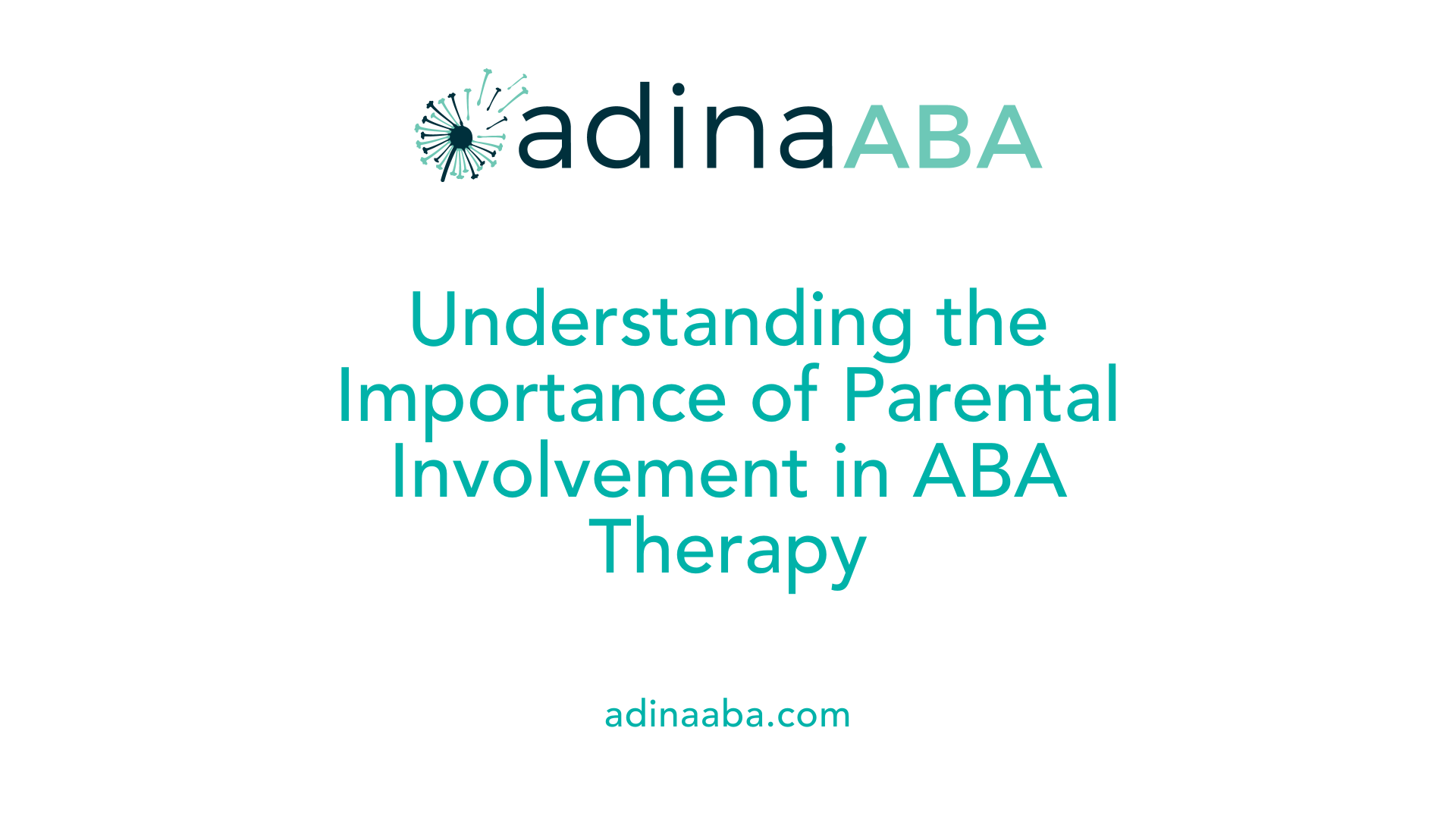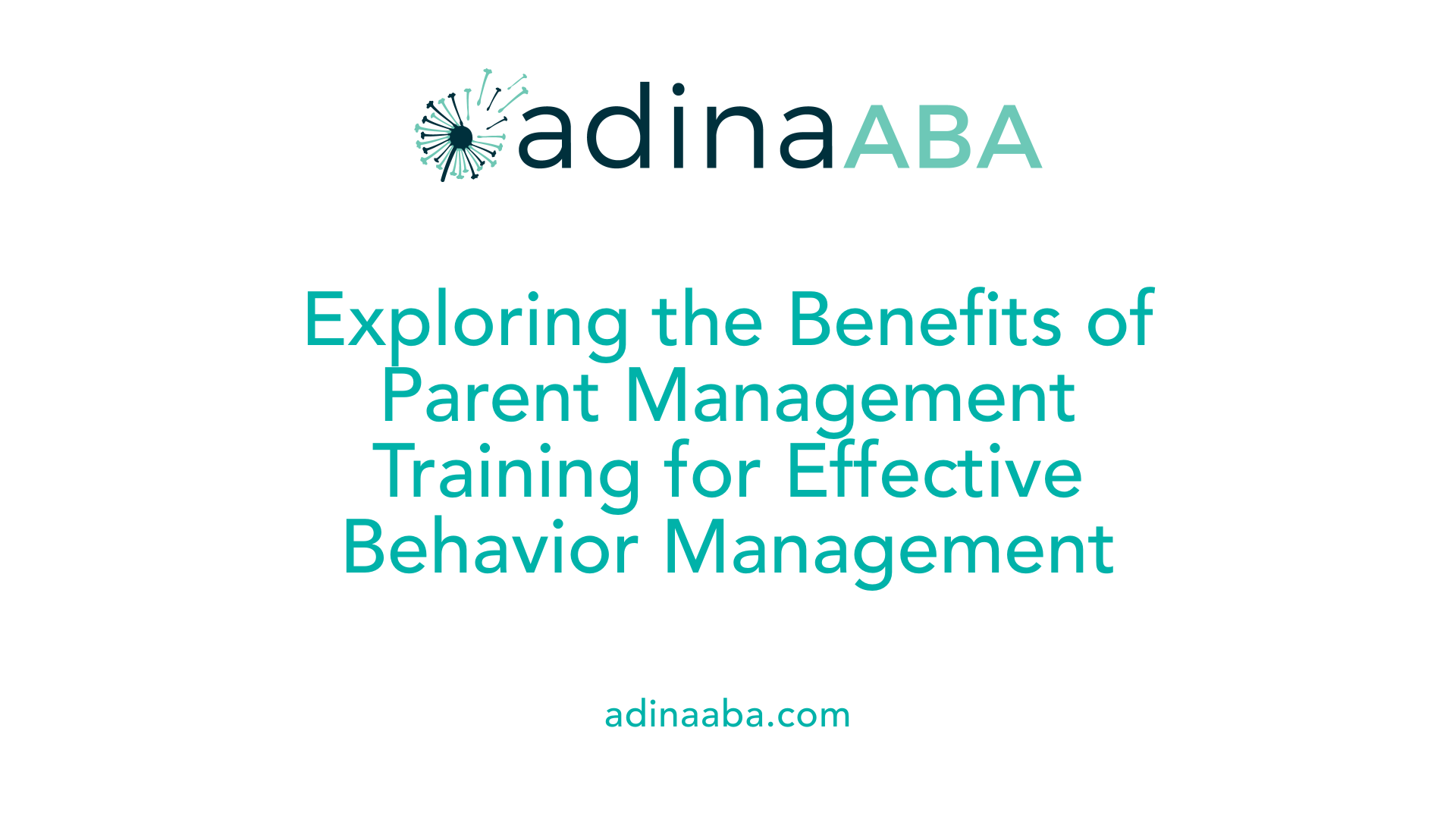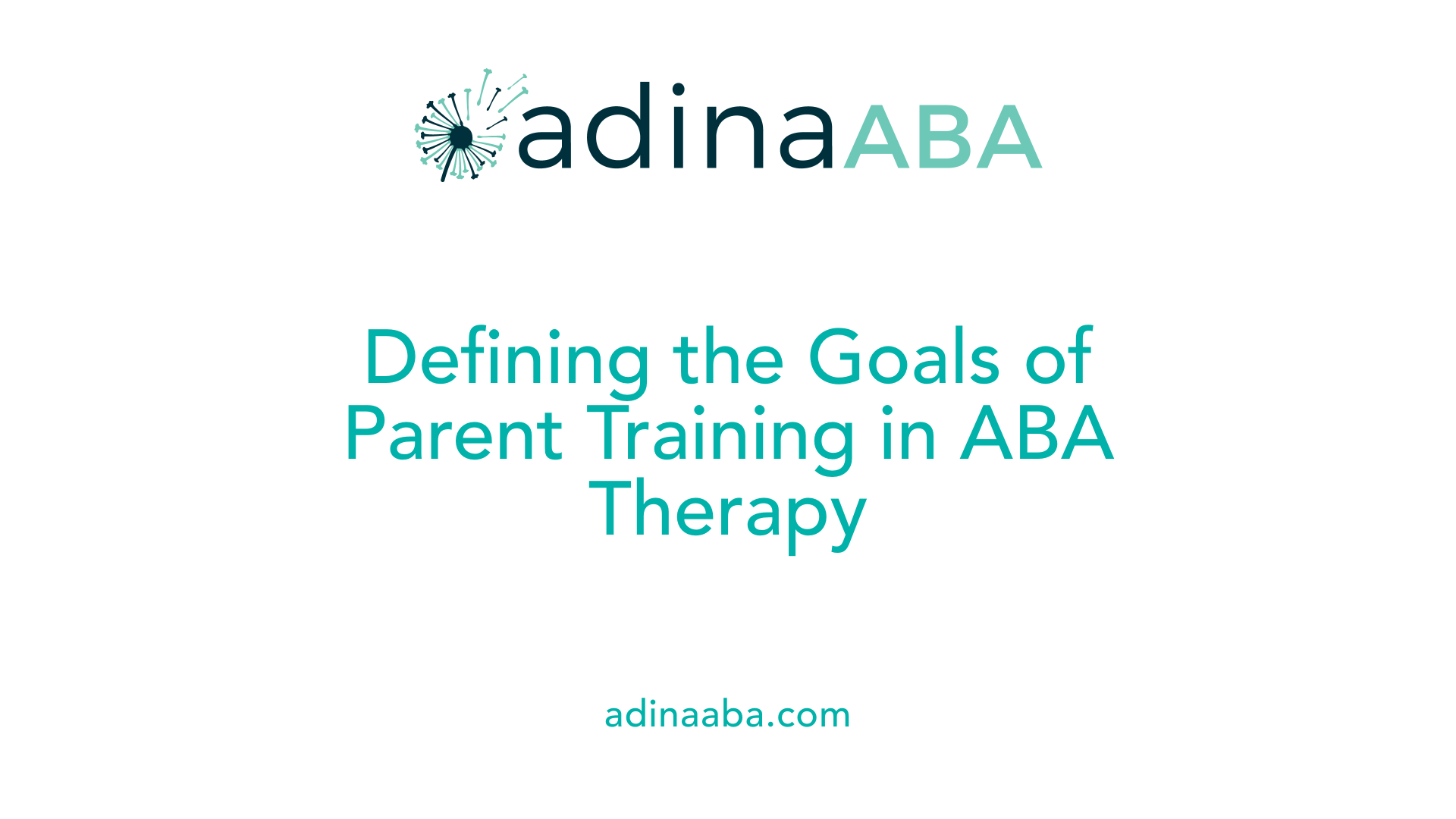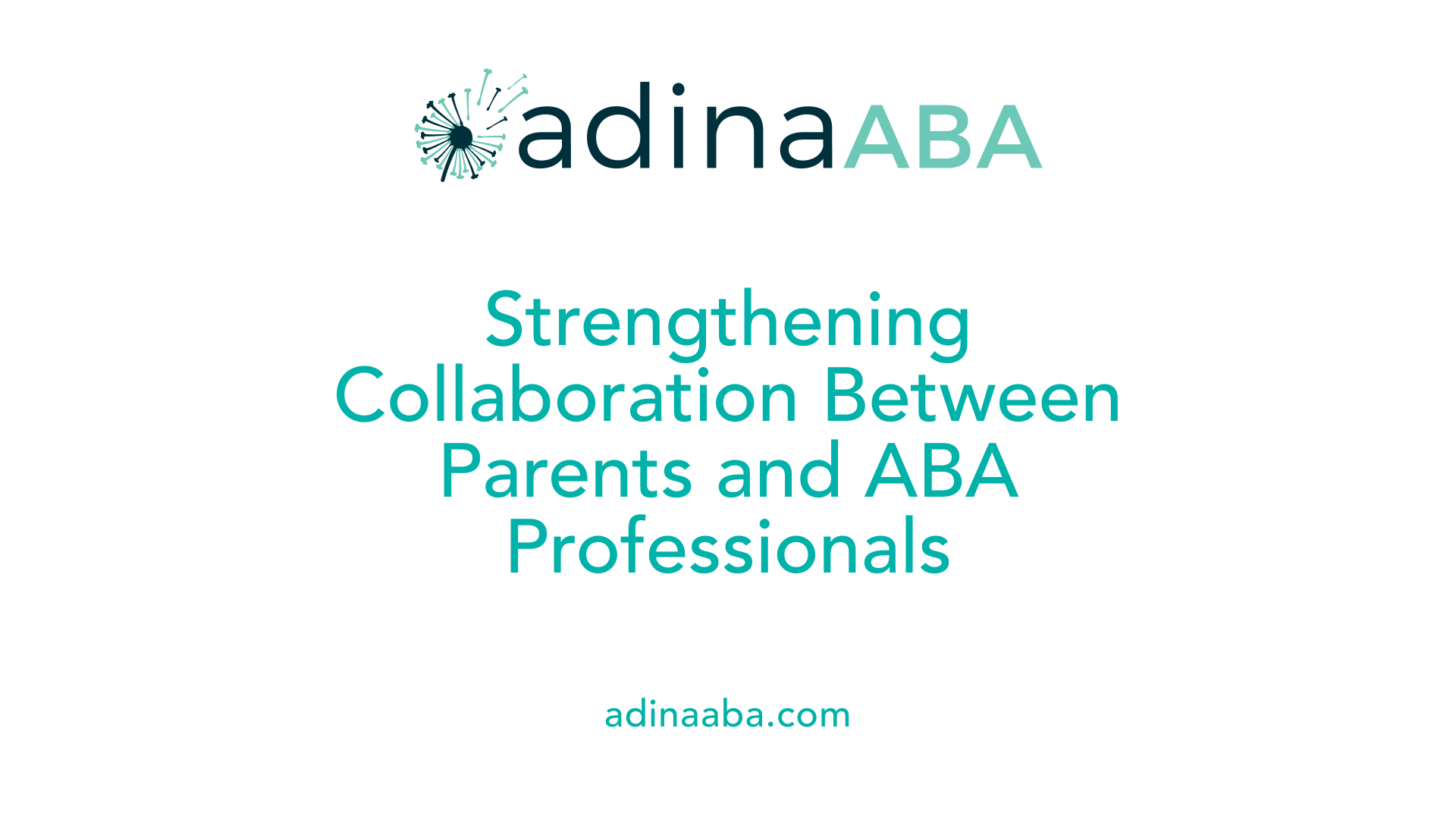Parent Training Programs in ABA Therapy: Why They Matter

Understanding the Importance of Parent Training in ABA Therapy
Applied Behavior Analysis (ABA) therapy is widely recognized as a leading intervention for individuals with Autism Spectrum Disorder (ASD) and other developmental challenges. A critical yet sometimes overlooked component of ABA therapy is parent training. By actively involving parents in the therapeutic process, ABA training not only enhances the efficacy of the therapy but also supports the broader development and well-being of the child and family. This article explores the essential role parent training plays in ABA therapy and the multitude of benefits it provides.
The Critical Role of Parents in ABA Therapy

Why is parent involvement important in ABA?
Parent involvement is crucial in ABA therapy as it fosters consistency and reinforces the skills that children learn in therapy sessions. Active participation allows parents to apply ABA principles in everyday situations, helping children generalize learned behaviors across different environments. This process ensures that skills acquired during therapy are practiced and maintained in real-life contexts—essential for effective learning.
By attending training sessions with a Board-Certified Behavior Analyst (BCBA), parents enhance their understanding of the methods used, which equips them to support their child's development effectively. The insights gained enable parents to assist their children in managing challenging behaviors using positive reinforcement techniques.
Moreover, parents play a pivotal role in tracking progress and collaborating with therapists. Sharing observations and concerns helps professionals tailor interventions and provides valuable information on the child’s needs. Such collaboration leads to informed decision-making regarding the child’s care, ensuring that treatment aligns with family goals and the child’s unique challenges.
How does parental participation affect therapy success?
Maintaining a positive and patient attitude serves as a model for children, aiding their emotional regulation and overall success in achieving therapy goals. When parents model appropriate behaviors and foster effective communication, they strengthen the emotional bond with their children. This bond creates a nurturing environment conducive to learning and makes it easier for children to engage in therapy.
In addition, parental involvement in ABA training is demonstrated to reduce stress, improve family interactions, and promote better behavioral outcomes. Studies show that children whose parents actively apply learned strategies tend to exhibit stronger communication and social skills, enhancing their adaptability in school and community contexts. Thus, investing in parent training not only benefits the child's learning but also enriches the family dynamics overall.
Benefits of Parent Management Training

What are the benefits of parent management training?
Parent Management Training (PMT) offers substantial advantages for families managing children's behavior. It equips parents with effective strategies to tackle disruptive behaviors, particularly beneficial for children displaying issues like Oppositional Defiant Disorder (ODD) and Conduct Disorder (CD). Parents learn to utilize positive reinforcement, enhancing desirable behaviors while efficiently managing challenging ones.
Structured techniques included in PMT, such as time-outs and consistent rules, help create clear boundaries for children. This fosters an environment where expectations are known, which in turn boosts the child’s understanding of acceptable behaviors. Not only does this process benefit the child’s behavior, but it also supports the mental health of parents by reducing stress and providing them with the tools to manage behavioral challenges confidently.
Early intervention is a cornerstone of PMT, crucial for preventing minor behavioral concerns from escalating into more serious issues often seen in adolescence. By tackling problems early, families can avoid future conflicts and promote healthier relationships.
Moreover, PMT encourages collaboration between parents, caregivers, and educators, fostering a consistent approach to behavior management across different settings. This collective effort enhances the reinforcement of positive behaviors, engaging the child in various environments, such as home and school.
Ultimately, PMT not only aims to improve the child’s behavior but also strengthens family dynamics through enhanced communication and effective conflict resolution skills, contributing to a more harmonious household.
Goals of Parent Training in ABA Therapy

What are the goals of parent training in ABA therapy?
ABA parent training is designed with multiple objectives that underscore the importance of parental involvement in the therapeutic process. One of the primary goals is to enable parents to facilitate the generalization of learned behaviors, ensuring that their children can apply the skills acquired during therapy in various everyday contexts—like home, school, and public spaces. This broader application not only reinforces learning but also enhances children's social interactions and daily living skills, contributing to their independence.
Moreover, parent training seeks to reduce stress for parents by equipping them with effective behavior management strategies. Parents gain valuable tools to address challenging behaviors, which fosters a sense of confidence and control in their parenting roles. This, in turn, leads to a more positive family dynamic, improving the overall quality of life for both the child and the family.
The structured nature of the training also promotes regular communication between parents and therapists, ensuring that everyone is aligned on goals and strategies. This alignment helps parents feel supported and engaged in their child’s developmental journey, reinforcing the benefits of an integrated approach to therapy.
Techniques and Strategies in Parent Training
Behavior Skills Training (BST)
Behavior Skills Training is an evidence-based approach employed in ABA parent training. BST typically involves the following steps:
- Instruction: Parents receive detailed teaching on specific ABA principles and techniques.
- Modeling: Clinicians demonstrate how to implement these strategies effectively.
- Rehearsal: Parents practice the strategies under supervision, receiving immediate feedback.
- Feedback: Continuous guidance helps refine their skills and addresses any challenges.
BST ensures that parents gain confidence and competence in using ABA methods in real-life situations.
Positive Reinforcement
Positive reinforcement plays a central role in ABA parent training. Parents are taught to apply this strategy to encourage desirable behaviors in their children. The approach involves:
- Identifying Rewards: Understanding what motivates their child, which could be verbal praise, tangible rewards, or special privileges.
- Timing: Reinforcing positive behaviors immediately to strengthen the connection between the action and the reward.
- Consistency: Regularly providing reinforcement to ensure children associate behaviors with positive outcomes, promoting repetition of such behaviors.
Communication Strategies
Effective communication is critical in parent training. Parents learn techniques to enhance interactions with their children, including:
- Using Clear Language: Simple and concise instructions help children understand expectations better.
- Non-Verbal Cues: Incorporating visual supports, such as charts or flashcards, aids comprehension.
- Active Listening: Encouraging dialogue by attentively responding to their child, fostering a stronger emotional bond.
Understanding these techniques empowers parents to manage challenging behaviors better while supporting their child’s development across various contexts.
Enhancing Skill Generalization and Independence
Applying Skills in Diverse Settings
Generalization is a vital aspect of Applied Behavior Analysis (ABA) that enables children to transfer learned skills from one environment to others. Parent training equips caregivers with strategies that aid in effectively teaching their children how to apply social and communication skills both at home and in public settings. By reinforcing skills outside of therapy, parents help ensure their child's ability to navigate various social situations.
Parents learn to implement structured reinforcement schedules and positive reinforcement strategies, which fosters consistency across different environments. This shared approach between parents and therapists allows for smoother transitions when children encounter new situations, thereby enhancing their adaptability.
Independence Through ABA Parent Training
Independence is another significant focus of ABA parent training. Caregivers are taught how to encourage self-care routines and promote autonomy in children. Strategies such as task analysis empower parents to break down complex tasks into manageable steps, facilitating skill mastery in a supportive environment.
Moreover, as parents become proficient in managing challenges using ABA strategies, their child's confidence and ability to cope with everyday tasks grow. Training not only nurtures essential life skills but also plays a crucial role in improving the parent-child relationship, fostering trust, and enhancing emotional bonding.
Through strong parent involvement in ABA therapy, families set the stage for their children to thrive, reinforcing long-term skills that contribute to greater independence in daily life.
Challenges and Solutions in Parent Training
Common Barriers to Training
Parent training in ABA is crucial but can be hindered by several common barriers.
- Stress and Overwhelm: Many parents feel overwhelmed by the challenges of managing their child's behavior, which can reduce their participation in training programs.
- Time Constraints: Busy schedules can make it difficult for parents to attend training sessions consistently, reducing their ability to learn and apply ABA strategies.
- Socioeconomic Factors: Economic stress can limit access to resources, making it challenging for families to engage fully in parent training programs.
- Lack of Understanding: Some parents may struggle with grasping ABA principles due to complex terminology or insufficient support, which can hinder effective application in daily life.
- Motivation Issues: Parents may lack motivation to participate consistently, especially if immediate results are not visible.
Strategies to Overcome Challenges
To address these barriers, several effective strategies can be implemented:
- Flexible Scheduling: Offering training sessions at varied times and formats (e.g., online or in-person) can help accommodate parents' schedules.
- Psychoeducation: Providing parents with foundational knowledge about ABA helps demystify techniques, increasing their comfort and engagement with the training process.
- Short, Focused Goals: Breaking challenges into manageable, bite-sized goals can prevent feelings of overwhelm and encourage steady progress.
- Support Networks: Creating community support groups can empower parents to share experiences and strategies, reducing feelings of isolation.
- Data Tracking Tools: Implementing simple, user-friendly methods for tracking progress can motivate parents by showing clear results over time.
Utilizing these strategies fosters a collaborative training environment, ensuring that parents are equipped to effectively support their child's development.
The Collaborative Role of Professionals and Parents

Collaboration with BCBAs and RBTs
Collaboration between parents and professionals such as Board-Certified Behavior Analysts (BCBAs) and Registered Behavior Technicians (RBTs) is essential for the success of Applied Behavior Analysis (ABA) therapy. BCBAs typically lead the training sessions, guiding parents through effective strategies to manage their child's behaviors. RBTs support this process by assisting families in the application of these strategies during practice sessions, under the supervision of BCBAs. This hands-on approach reinforces the relevance of the skills learned, enabling parents to implement techniques that foster their child’s development in real-world settings.
Furthermore, maintaining regular communication between families and clinicians is crucial. Weekly, bi-weekly, or monthly sessions foster ongoing dialogue about challenges and advancements, ensuring parents feel supported and informed. This partnership not only enhances understanding but also aligns therapeutic goals with family needs.
Monitoring Progress and Adjustments
Monitoring progress is another critical aspect of parent training. Regular check-ins help both parents and professionals gauge the effectiveness of interventions and make necessary adjustments. Parents are encouraged to track their child’s behavioral progress and share this data during meetings.
As strategies are tailored to the unique dynamics of each family, adjustments can be made based on what works best for the child’s growth and development. This flexible approach not only supports the child’s progress but also reassures parents that their involvement is making a difference, ultimately fostering a sense of teamwork and commitment to the child’s success.
The Long-term Benefits of Parent Training Programs
Impact on Family Dynamics
Parent training in Applied Behavior Analysis (ABA) significantly transforms family dynamics. By equipping parents with strategies to manage challenging behaviors, the training fosters a supportive environment for the child’s development. This active involvement not only strengthens the emotional bond between parents and children but also empowers parents to effectively advocate for their child’s needs. Families report improved communication and interactions, leading to a nurturing atmosphere that enhances overall family welfare. Research reveals that parent training reduces stress levels for caregivers, resulting in a more harmonious household.
Sustaining Gains and Preventing Regression
Ongoing parent training plays a critical role in sustaining behavioral gains achieved during therapy. By teaching parents the principles of ABA, including the use of positive reinforcement and behavior management techniques, parents can help their children apply learned skills consistently across different settings. This generalization of skills ensures that children maintain their progress and prevents regression. Regular practice and application of these strategies in daily life solidify new behaviors, contributing to long-term success in the child’s development.
Concluding Thoughts: Building Strong Foundations
Effective ABA therapy extends beyond the clinic and into the homes and lives of children diagnosed with ASD. Parent training ensures that the principles of ABA are consistently reinforced across various settings, thereby fostering long-term successes. By understanding the pivotal role they play, parents not only facilitate their children's therapeutic processes but also enhance family cohesiveness and improve their own capacity to manage and mitigate challenges effectively. As more families engage with parent training, the positive ripple effects across individual lives and communities underscore the undeniable value of these programs.
References
- Why Parent Training in ABA is Critical to Success
- Parent Training in Applied Behavior Analysis Treatment
- 8 Reasons to Complete ABA Parent Training
- Helping Parents Understand Applied Behavior Analysis: Creating a ...
- ABA Parent Training: The Complete Guide To Helping ... - Master ABA
- The Importance of Parent Training - Blue Gems ABA
- 10 Steps for Effective ABA Parent Training - CentralReach
- Parent Training in ABA Therapy - Supporting Family Success
- 9 Reasons to Complete ABA Parent Training & How it Helps Kids
- What Is Parent Training & What Role Does It Play To ABA Therapy
More Resources
Expert Clinicians
Get started today ->


.jpg)



